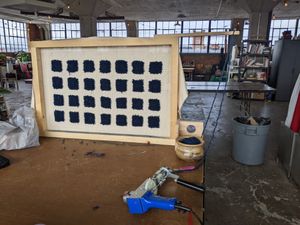I spent much of my twenties working at makerspaces, consumed by building bike sheds. Bike-shedding, also known as Parkinson's law of triviality, is the organizational habit of assigning disproportionate weight to trivial issues. It’s an easy habit to fall into at a volunteer organization; no one wants to do the bookkeeping, but everyone has an opinion about how the bikes should be stored. I spent weeks and months tied up in these kinds of trivial projects, which ultimately kept me from doing the very thing I joined a makerspace to do: making things.
I learned my lesson and tried to keep the business model of the space as my top priority. Later, after I had been hired to run a different makerspace, I found myself bogged down with more weighty issues – writing grants, negotiating with our landlord, modeling revenue streams – and didn’t have time to make anything at all. I am sure someone has cracked this code but for me, there is an inverse correlation between time spent building the space and time spent building anything else.
Recently I found a new space to work out of, and I have been so impressed with the functionality and professionalism of the shop. Rather than being run by an amorphous constellation of volunteers, this shop is managed by a small group of directors, each with a financial stake in the business. The tools and facilities just work, and a bike rack was installed out front with no fanfare. I am happy to pay membership fees, and put all my tools back where they belong, in exchange for the opportunity to just make things.
-Hillary
The most clicked link from last week's issue (~16% of opens) was about artist Tom Sachs' cult-like studio culture. In the Members' Slack, the #community-lunch crew got excited about FullControl's radical approach to FDM gcode: no slicing, all explicitly designed toolpaths. Thanks to Chris for the tip! If you want to nerd out on tools, join us.
Jobs.
- Xona Space Systems is hiring an RF test engineer in Burlingame, CA.
- Solvento is hiring a QA automation engineer in Mexico City.
- Watershed is hiring a lifecycle assessment engineering manager in SF.
- Sonos is hiring a senior molding and tooling engineer in Boston.
- Framework is hiring a remote content creator.
- More jobs on Scope of Work's job board; you can promote the role you're hiring for here.
Sponsored.
How complex is your CNC part? Weight, size, hole depth and diameter, and non-standard threading all add complexity. Fictiv offers a quick 10-step quiz to assess your part and offers CNC solutions at ridiculously fast speeds — 2-5x faster than your average machine shop.
Planning & Strategy.
Kate Wagner has been putting out some really incredible work. She’s an architect and cultural critic who first rose to fame with her satirical McMansion Hell blog. The blog lampoons the opulent interiors and bizarrely shaped roofs of overbuilt nouveau riche homes, and that same acerbic wit and critique of unregulated wealth accumulation carries over into her essays elsewhere. I enjoyed her piercing critique of Saudi Arabia’s proposed linear city (“The Line”) and the twelve lauded architecture firms who have signed on to build the “dystopian nightmare-cum-PR-project.” She argues that architecture is rife with hypocrisy: firms put forward a progressive image and espouse environmental values while taking on contracts from despotic regimes.
My partner and I recently bought our first home, and while we were looking through listings, I was floored by how many houses have been summarily desaturated. This piece on the proliferation of greige-painted interiors puts the style in context. Wagner attributes this trend to the technological entrenchment of the real estate–industrial complex: greige boxes are easier to stage, easier to photograph and apply post-production effects to, and thus easier to sell for the highest price. She urges us to think of our houses “not as investment assets but as canvases for creativity and self-expression,” and to not lose track of the most important fact: that housing is a human right.
I enjoy Wagner’s work because she tackles intractable problems like income inequality and gentrification with humor and grace. Beyond writing about architecture, she’s a prolific sports journalist. Also, see her piece about How It’s Made which celebrates its depictions of working-class labor.
Making & Manufacturing.
I’m incredibly curious about Apple’s move to produce more iPhones in India. The company has been building lower-end phones in India since 2017, and recently ramped up production of flagship phones. The Indian commerce minister claimed that Apple is aiming to move 25% of all iPhone production to India, but there are challenges ahead. Indian labor productivity is lower than in other Asian countries – for example, McKinsey estimates that electronics manufacturing in South Korea is 18 times more productive. Apple is already experiencing production issues, with a casings factory run by Tata running a ~50% rejection rate in February. Nevertheless, they’re forging ahead. Apple appears committed to working through production problems – the company recently relocated an executive overseeing enclosure quality to India, and is actively recruiting for more support.
Apple isn’t making these investments in a vacuum: Prime Minister Narendra Modi is focused on growing Indian manufacturing. One initiative is the Make in India policy (mentioned by James in March), which aims to create 100 million domestic manufacturing jobs and raise the sector's GDP contribution to 25%. And to attract investment, Modi has implemented production linked incentive (PLI) schemes that offer a percentage of a firm’s sales back as economic incentives. Apple is eligible to get 4-6% back on the sale of iPhones produced in India until 2025, sweetening the deal for relocation. And the scheme seems to be working for India, as Apple has already created 100,000 jobs through PLI participation (note: the article refers to 1 lakh jobs, which is equivalent to 100,000).
While production patterns are changing, only one out of the eleven India-based factories on Apple’s most recent supplier list is domestically owned:
- Cheng Uei Precision Industry Company Limited (Foxlink) - Taiwan-based
- Flex Limited - American/Singaporean multinational
- Hon Hai Precision Industry Company Limited (Foxconn) - Taiwan-based
- Jabil Incorporated - US-based
- Lingyi iTech (Guangdong) Company - China-based
- Pegatron Corporation - Taiwan-based
- Shenzhen YUTO Packaging Technology Company Limited - China-based
- Sunwoda Electronic Company Limited - India-based
- Taiwan Surface Mounting Technology Corporation - Taiwan-based
- Wistron Corporation - Taiwan-based
- Zhen Ding Technology Holding Limited - Taiwan-based
By contrast, six out of the eleven factories are owned by Taiwanese firms. Taiwan began investing in its manufacturing sector in the 1950s, resulting in decades of economic growth and industrial expertise. That investment is evident today; Taiwanese firms are involved in advanced manufacturing around the world. While the goals of the PLI scheme don’t target the growth of domestic firms (they center around job creation, attracting investment, and boosting exports), I am curious to see if they result in more Indian manufacturers anyway. The relationship between manufacturing and economic complexity is one of my ongoing fascinations, and making iPhones could be a stepping stone to making a whole lot more.
Maintenance, Repair & Operations.
Mexico City's metro system, which is used by 5.5 million passengers a day, is in poor repair. It is plagued by failing automation systems and unreliable communications, and has experienced a string of dramatic accidents in the last few years – including an overpass collapse that killed 26 people. Without reliable automation or radio, conductors depend on WhatsApp group chats to communicate with each other and avoid collisions. One train operator reported that nearly every operator on her line coordinates on their phone while in transit, paying for data out of pocket.
The metro runs a $1.4 billion USD deficit, and its maintenance budget was cut by nearly 40% between 2018 and 2021. I appreciated this impassioned argument for developing new funding sources for the system, including increasing the city’s car-ownership taxes, increasing parking fees, and introducing congestion-responsive pricing in some areas of the city.
Distribution & Logistics.
As Chris Miller writes in Chip War, Russia’s Cold War strategy of copying foreign-made semiconductors has resulted in decades of straggling. In the 1950s, scientific papers about solid-state physics and semiconductors were available in the USSR, and sample chips were sent back to Moscow by soviet agents (daylighting as Stanford students) to be reverse engineered. But without process knowledge Soviet engineers struggled to reproduce chips, and they lacked reliable supply chains for chemicals, optics, and purified silicon. Reproducing the last generation of a rapidly advancing technology kept the Soviet Union behind the curve.
Cold War-era chips were reverse engineered at a purpose-built high tech city: Zelenograd. It was a secretive place until the fall of the Soviet Union, with prohibitions on photography and foreign visitors. Today Zelenograd is more or less a suburb of Moscow, but it maintains a tech sector aided by a special economic zone designation. There is even a flashy website advertising it as Technopolis Moscow.
Despite the branding, the technopolis is still playing catch-up – Russian firms are aiming to produce 28 nm chips by 2030, whereas TSMC passed that goalpost in 2011. This technological imbalance is being used for political leverage: following the invasion of Ukraine, US-led sanctions banned the sale of semiconductors to Russia as a means of limiting Russia’s ability to build weapons. The strategy isn’t perfect, as $2.6 billion worth of computers and electronic components were imported into Russia through shell companies in the seven months following the invasion of Ukraine.
Inspection, Testing & Analysis.
This thoughtful profile of a wave research facility is a much needed dose of climate optimism. At the O.H. Hinsdale Wave Research Laboratory, scientists study how coastal regions are being affected by climate change and model novel interventions. The lab hosts a 104-meter long wave flume that can recreate coastal conditions for experiments, and a 49-meter directional wave basin that mimics wave propagation and tsunami conditions. I appreciate how the article (replete with fun photos of kayaks inside the flume) puts the scientists and their passion for their work front and center. Many of the experiments model how seaside communities can protect themselves from changing coastlines, aiming to reshape our relationships with shorelines. As Julia Hopkins, one of the lead investigators profiled, says, “Transformational adaptation is a real thing. We can’t incrementally adapt; we have to completely transform the landscape now.”
I also appreciated the section on Earth observation data and climate science in last week’s issue of The Orbital Index. Satellite imagery is a key tool for gathering data to better understand the climate. Satellite data was recently used to identify methane super emitter events, and to study the carbon absorbed by reforested areas (unfortunately, they only absorb only 26% of the emissions released by destroying the original forest).
Scope Creep.
- Sometimes I think of a clever title for an article I’ve yet to write, only to discover via Google that someone’s already used it. I’m researching reshoring and considered writing a piece called We Have Never Been Post-Industrial, a play on Bruno Latour’s We Have Never Been Modern. Lo and behold, someone took that title for a rather interesting meditation on artisanal labor. The essay centers around a short film that juxtaposes two “post-industrial” workers: a competitor in the US Barista Championship and a gig-worker 3D modeling the winning cappuccino. It’s a reflection on the fractured nature of labor and the cultivation of lifestyle as a product in a “post-industrial” economy. The article does the title justice; I accept defeat.
- This article about the impossibility of repairing Bluetooth earbuds makes great use of Lumafield’s CT scans!
Thanks as always to Scope of Work’s Members and Supporters for making this newsletter possible. Thanks also to the team at Hamilton Craft Studios for running a tight ship. 🫡
Love, Hillary
p.s. - We care about inclusivity. Here’s what we’re doing about it.
Editor's note: When first published, the country of origin for Jabil Incorporated was misstated and has been corrected. A $10 donation to the Open Hardware Association has been made.




